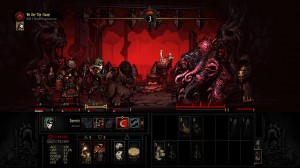If there are two concepts that are opposed to one another in game design they would have to be skill and RNG (or Random Number Generator). They each have their own foundation in action and RPG design respectively, and many games that try to combine the two face an uphill battle. Understanding what both elements mean for progression is essential for any game designer who wants to skillfully roll the dice.
Who’s in Control?
Skill and RNG operate at opposite ends of the spectrum when it comes to the player’s control over their success. Skill-based games put the player in complete control over success or failure. Titles like Ninja Gaiden, Cuphead, Furi, and many more are designed around the player becoming better at the game, and in turn, the game becoming easier.
In skill-based titles, while there may be abstracted upgrades or improvements, at the end of the day, nothing that the player unlocks will take the place of skill when it comes to winning.
RNG progression is seen in titles that have either loot tables or loot pools to determine potential upgrades. Popularized in ARPGs and rogue-likes, the player doesn’t know what to expect in terms of their options over the course of playing. While skill is still a factor, the difficulty (and oftentimes success) is determined by what the player will find.
As more designers have been combining action and RPG design in their titles, the balance of skill and RNG has become a more prominent design challenge.
Rolling the Dice:
Skill-based titles always put the player first which has its own pros and cons. For players who can rise to the challenge, they will find a game that will keep them on their toes until the very end. The problem with skill-focused titles is that they do not offer any workarounds for players who get stuck. If you can’t beat a boss in Furi or Cuphead, there is no amount of in-game progression that will supplement your ability.
The purpose of having RNG is to add that randomness to the equation. In the Binding of Isaac, a run can drastically change all because of picking up one item. By having variance on each play, it keeps the experience from becoming repetitive; while offering lesser skilled players another way to win. There are item combinations in Isaac that are just game-breaking and lead to an easy win.
However, when your experience is up to RNG, it does become a debate when the player is supposed to be in control.
It can be very frustrating playing a game and knowing that no matter how good you are at it, if a certain item or event doesn’t happen, your chance of winning drops considerably.
With that said, a part of having skill in a game is knowing how to subtly mitigate RNG.
The Skill Factor:
As we’ve talked about many times before, there is no such thing as a 100% random game. Random elements always have fixed conditions or rules associated to them, and those fixed elements can give expert players an advantage.
Knowing how to read the AI or what’s the best possible action can do a lot to mitigate the effect RNG has. Playing through the Darkest Dungeon, I know what are the best classes to take into each area, and in turn, that gives me a leg up compared to someone who just takes a random group.
Even though RNG can lead to disastrous outcomes, a great player can do what they can to reduce the chance of that happening.
The challenge when it comes to any designer wanting to have both elements factor into their gameplay comes down to how much of an impact they have.
The Master at Work:
The main reason for combining the two elements of RNG and Skill into game progression is to provide more replayability to a title.
In a paper I wrote a while ago about the abstraction of skill, we looked at the merging of action and abstracted (or RPG) game design with titles like Borderlands, Fallout 3, The Witcher 2, among others.
The more control that either RNG or Skill has on progression will impact different aspects of the gameplay. When skill is the dominating factor, it can lead to cases where there’s not enough RNG to create variance within different plays. Most gamers will arguably agree that once they have completely mastered a game that their interest levels in it will decline.
Even with a game like Spelunky, whose procedurally generated levels are some of the best around are lacking in the variance department. The level design in of itself doesn’t have enough elements to create different challenges. While the layouts are obviously different on each running, what the player is doing and what they have to watch out for remains the same.
For that very reason we have seen an increased focus on RNG with modern examples of rogue-like design. The more variance you can add to your game will lead to it being more replayable, but there is a catch.
Depending on the luck of the player (or more accurately the RNG present) that can create a huge swing in terms of the experience. No matter how good the player is at the game, their experience is going to be tied to the RNG; for good and for ill.
You can have runs of the player steamrolling everything just as you can have epic fails. We’ve talked about the presentation of failure before, and how no one likes to lose. One option we’ve seen is to have a persistent system that always pushes the player forward; win or lose. If your game is going to be built heavily on RNG, be careful if you decide to have punishment mechanics on lost. If you really want to make someone hate losing, having them lose resources is an easy way to twist that knife.
If you’re going to focus on RNG, then there must be enough elements to make each run truly different. Not only does that provide more variance, but it also keeps the game from becoming a case of only a few options will make the game winnable.
Skillful Slots:
Some of my favorite games lately have combined skill and RNG to create a unique mix of rogue-like design. However, getting both elements to work is not easy, and a developer can mess up by pushing too far to either extreme.
For you reading this: How much should Skill and RNG matter to playing the game?




